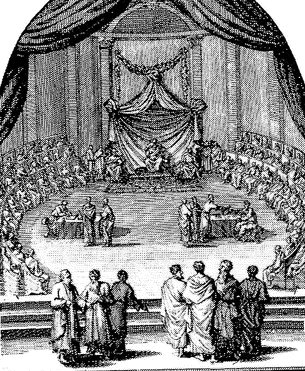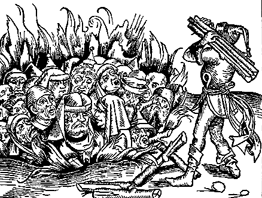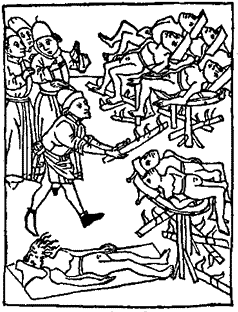WHO KILLED JESUS? |
 |
- By Jewish leaders at the house of Caiaphas, the High Priest.
- According to John he was taken first to Annas and then to Caiaphas.1.
- By Pontius Pilate.
- Luke mentions another interrogation, this time by Herod.2.
There were apparently two judgements first a Jewish one, where he was judged to be worthy of death3. And secondly a Roman one when he was regarded as not guilty.4. The Jewish gathering at the home of Caiaphas where elders and scribes were present is often taken by Christian commentators as being a Sanhedrin, where 23 judges were required.
(1.) John, 18, 13. (2.) Luke 23, 7. (3.) Matthiew 26, 66; Mark 14, 64. (4.) Luke 23, 4. John 18, 38.
1. WHEN WAS THE JEWISH "TRIAL" ? |
The accounts say that Jesus was arrested during the night after the last supper and was interrogated by the Jewish authorities the next morning before the cock had crowed.5. The last supper is usually taken to mean the meal when the Paschal lamb was eaten, which was the first eve of Passover, known today as Seder Night. The Jewish interrogation would then have taken place on a Yontov (Yom Tov) a holy day, on which no work was allowed to be done.6. But this leads to two problems:
- Jewish law does not permit a court case to be tried on that day, and certainly not a Sanhedrin, as some have suggested. A Jewish day runs from sunset to sunset. So no trial would have been permitted for at least 24 hours from the beginning of the last supper.
- When a sentence of death is passed, Jewish Law stated that the sentence could not be pronounced until the following day, to allow for careful deliberation.7. So if there really was a trial on First day Passover, then the judgement should not have been given until the second day.
(5.) Sanhedrin, 4, 11. (6.) Sanhedrin, 4, 1. (7.) Sanhedrin, 3, 5.
2. WERE THERE GROUNDS FOR A DEATH SENTENCE? |
The Gospel accounts say that at the Jewish interrogation:
- He was suspected of claiming to be the Messiah 8.
- He hinted that he was the son of God, while according to Mark he clearly claimed to be the son of the Blessed One.9.
- He was judged to have uttered blasphemy.10.
a.) If Jesus had claimed to be the Messiah, it would not have been a crime. At that time a Messiah was a person anointed by God for a particular purpose. It might have been thought presumptuous or mad, but it would not have been thought to be blasphemy.
b.) The son of God is a vague expression, which can be interpreted in various ways. If he meant by this, that he regarded himself as a child of God as all people are sons or daughters of God, then this would have been acceptable. (Jews to this day speak of God as their Father (or Parent), and the Bible refers to the children of Israel as His firstborn.11. It is extremely unlikely that he meant that he was a child born by immaculate conception and hence he was part of a trinity, because those beliefs were not suggested until Paul developed his theology. However even that was not considered as blasphemy or punishable by death.
c) The term son of man which Jesus used is also obscure. But some take it as referring to a mystic verse in Daniel variously translated as one like a son of man or as one like a human being 12. This was understood by some as referring to the Messiah, while others take it more literally.
c.) It follows from all this that a conclusion that Jesus had blasphemed was very unlikely, and if it had been made would have been unsound. For Jesus had not spoken of God in a derogatory or contemptuous way, nor had he misused the sacred Divine name.13.
(8.)Matthew, 26, 63; Mark, 14, 61; Luke, 22, 67. (9.) Matthew, 26, 65; Mark 14, 61f; Luke, 22, 70. (10.) Matthew,26, 65f; Mark 14, 64. (11.) Exodus 4, 22; Jeremiah 31, 9. (12.) Daniel 7, 13, (as in New RSV.) (13.) Sanhedrin 7, 5.
3. WHAT WAS PILATE'S MAIN CONCERN? |
The accusations and the questions asked when Jesus was brought before Pontius Pilate were very different. The Luke says that the Jewish leaders accused Jesus of fomenting trouble, of telling the Jews not to pay their Roman taxes, and of claiming to be the Messiah, the anointed king.14. The only question that Pilate is reported as asking was: Are you the king of the Jews?15. To which Jesus answered that people were saying this about him. At this Pilate says that Jesus is innocent.
The question of kingship arose from the claim that Jesus was the Messiah. The word Messiah (Greek Christos) means anointed one. The Bible tells us that two kinds people were officially anointed for special purposes. They were either priests or kings. So we read that Moses anointed Aaron and his sons for the priesthood16. and Samuel anointed both Saul 17.and later David.18. to be kings. The Gospel writers claimed that Jesus was descended from the royal line of David.19. No attempt was made to claim his descent from Aaron, showing that they clearly regarded him as a Kingly Messiah.
(14.) Luke, 23, 2. (15.) Matthew 27, 11; Mark 15, 2; Luke 23, 3; John, 18, 33 (16.) Exodus, 40, 13 - 15. (17.) 1 Samuel 15, 1. (18.) 1 Samuel 16, 13 (19.) Matthew 1, 1ff; Luke 3, 31.
4. HOW DID THEY SPREAD THE BLAME? |
The Gospels then describe how Pilate tries to give the people the chance to free Jesus as part of a special amnesty for Passover. There is no mention of this practice other than in the gospels. No explanation is given as to why this was necessary. After all, the Roman Procurator had supreme power and if he had really found no fault in him, it is rather strange that he did not just let him go? It is also a coincidence that the man the people chose to release was called Barabbas. For that Aramaic name means son of the father.
5. DID THE JEWS GIVE A DEATH SENTENCE? |
At that time the Jewish courts were not permitted by the Romans to sentence people to death.20. The Talmud states that this power had been taken away from them 40 years before the destruction of the Temple in 70 CE.21. This would take it back two or three years before the accepted date of the crucifixion.
Crucifixion was not one of the four methods of executing criminals as laid down in Jewish Law. The Bible states that the punishment for blasphemy was stoning.22. Crucifixion was a common Roman method, and many Jews were killed by the Romans in this way.23.
(20.) John, 18, 31. (21.) Sanhedrin 41a; Jer. Sanhedrin, 1, 1.(22.) Lev. 24, 11ff. (23.) Josephus: Antiquities 13, 17, 10 and Wars 2, 5, 2.
6. WAS PILATE INNOCENT? |
According to Matthew, Pilate washed his hands to signify that he was not responsible for the death of Jesus.24. In the other gospels he clearly disassociates himself from the killing. But was Pilate really such a kind and just man? Philo of Alexandria quotes King Agrippa I, a contemporary of Pilate who knew him well, as saying of him He was cruel by nature and in his hard-heartedness entirely lacking in remorse.25. History records that he was a harsh oppressive ruler who killed many of his Jewish and Samaritan subjects.26. It was an act of atrocity towards Samaritans that eventually caused Vitellius, Roman governor of Syria, to have Pilate recalled to Rome in 36 CE and replaced as procurator.
(24.) Matthew 27, 24. (25.) Philo: De Leg. 38. (26.) Josephus: Wars 2, 9, 2ff. & Luke, 13, 1.
7. WHY WAS JESUS CRUCIFIED? |
The answer to this lies in the accounts of the interrogation before Pilate. Luke is the only gospel to state the charges made before Pilate. They were that he was found perverting our nation, forbidding us to pay taxes to the emperor, and saying that he himself is the anointed king.27. In the four gospels, the only question Pilate is reported to have asked was Are you the king of the Jews?28. To Pilate he appeared to be a dangerous agitator stirring up opposition to Roman taxation and setting himself up as a secular rebel Jewish leader. His only option was to get rid of him, as he had already done to others who had opposed Roman rule.
We can see that his claim to kingship really got up their Roman noses. The crown of thorns and the purple cloak were clearly mocking this claim. Although the text of the notice placed at the foot of the cross is slightly different in the four gospels they all referred to him being the King of the Jews.29.
All this points to crucifixion being both ordered and carried out by Romans. In fact, the Roman historian Tacitus, writing about time when the gospels were written, stated: Jesus, the founder of the sect, was executed by the procurator Pontius Pilate during the reign of Tiberius.30.
(27.) Luke 23, 2. (28.) Mark 15, 2; Matthew 27, 11; Luke 23, 3 & John 18, 37. (29.) Matthew 27, 29; Mark 15, 17 & John 19, 2. (30.) Annal, 15, 44.
 |
8. WHY BLAME THE JEWS? |
The Gospel accounts did not put the blame only on the Jewish leaders; but by stating that the crowd clamoured for Jesus' death, they accused the general Jewish populace as well. To understand this, we need to remember the historical situation at that time.
The gospels were written about 30 to 70 years after the crucifixion, (but many of the stories existed verbally prior to being written down). By this time the early Christians were actively seeking converts within the Roman Empire. The gospel writers were not trying to write an objective and accurate history, so much as to persuade people to believe in Jesus and join in following his teachings. As most of the people they were approaching were Romans, it was not a particular persuasive message to say to them "Join our religion, worship to or through Jesus, and by the way, you Romans were responsible for killing him." It made more sense to blame the Jews who for more than a generation had refused to recognise him as either the Messiah or as the "son of God".
9. WHAT WERE THE RESULTS? |
 |
As a result of these stories being told to the largely uneducated masses of Christians in the middle ages, the Jew was thought of as the "Anti-Christ", an object of hatred and suspicion. Jews were often spoken of as "Christ-killers". Quite unintentionally, the gospel-writers slant on history gave rise to centuries of murder and persecution of Jews. Nobody knows the number of Jews killed in the Rhineland by Crusaders on the way to the way to the Holy Land, nor of those who died at the hands of the Spanish Inquisition. Almost every ancient town and city in Europe where Jews lived, has a tale to tell of Jews, who died there just because they were Jews. The Gospels have had a strong influence on the spread of anti-Semitism right up to and including the Holocaust. A very large proportion of the attacks on Jews took place at Easter, following an impassioned sermon by an over-zealous preacher on Good Friday, who had incited the mob to fall upon the ghetto. It is so easy to stir up fear and hatred and so difficult to spread feelings of peace and brotherhood. That is why Jews fear the result of releasing the film called "The Passion". And that is why this page has been posted on the web, in the hope of spreading a little truth and light rather than hatred and passion.
10. HOW DO MATTERS STAND NOW? |
In the mid 1960s, following a lead from Pope John XXIII, the Roman Catholic Church made considerable progress to come to terms with these problems. Regarding Jewish guilt for Jesus' death, the second Vatican Council declared that ...authorities of the Jews and those who followed their lead pressed for the death of Christ. … Still, what happened in His passion cannot be blamed upon all the Jews then living, without distinction, nor upon the Jews of today. However, even this statement did not go as far as some Catholics would have liked, because the sentence the Jews should not be presented as repudiated or cursed by God,which appeared in the final draft, originally included the words: or guilty of deicide in earlier drafts of the Declaration; but this last phrase was removed before the final draft was published.31.
Among the various Protestant groupings, the attitude is even more sympathetic.
(31.) Material gathered from www.historicalextarchive.com.